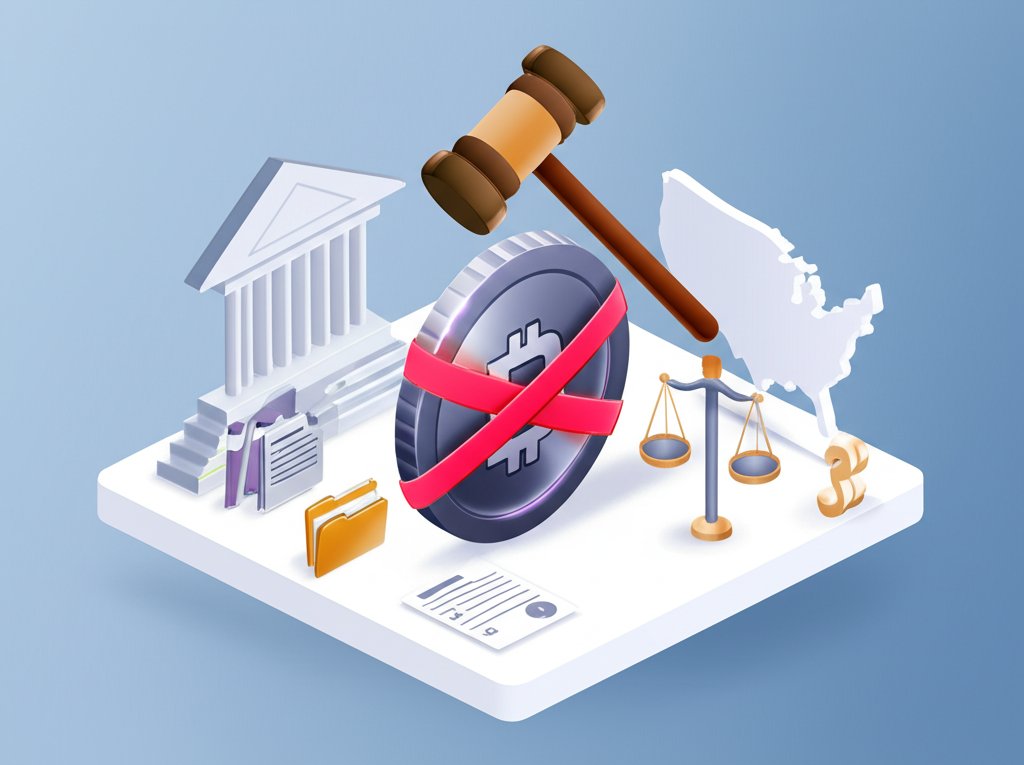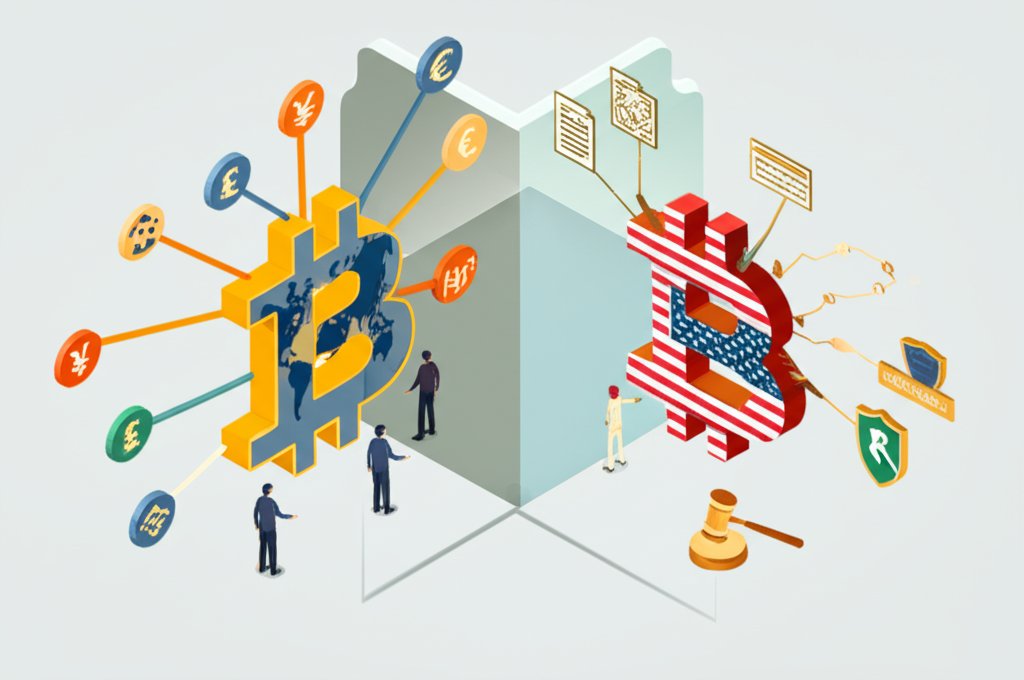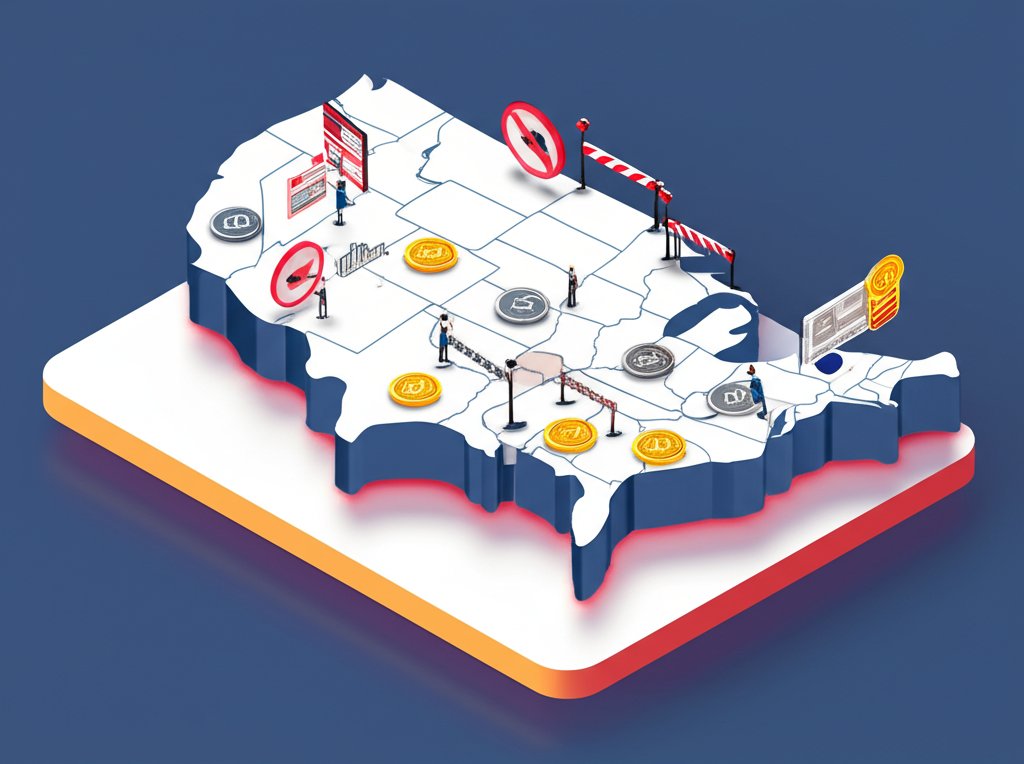
Trying to figure out can Binance be used in the US can feel like navigating a maze. On one hand, Binance is a global crypto giant; on the other, strict US regulations mean the experience for American users is fundamentally different—and often, far more restricted—than for users elsewhere. This isn't just a matter of convenience; it’s a critical legal and financial distinction that could impact your access, assets, and even expose you to regulatory risks if you're not careful.
At a Glance: Binance in the US
- Two Distinct Platforms: Binance.com (global, generally off-limits for US residents) and Binance.US (a separate, regulated entity for American users).
- State-Specific Access: Binance.US isn't available in all US states, including New York, Texas, Hawaii, and others.
- Feature Limitations: Binance.US offers significantly fewer cryptocurrencies and features (e.g., no futures, margin trading, or staking) compared to its global counterpart.
- Regulatory Scrutiny: Both entities have faced legal challenges from US regulators, highlighting the complex compliance landscape.
- VPN Risks: Attempting to access Binance.com from the US using a VPN violates Binance's terms of service and potentially US state law, risking account freezes and fines.
- KYC is Mandatory: US users must complete strict Know Your Customer (KYC) verification, including proof of US residency, for Binance.US.
Untangling the Two Binances: Global Reach vs. US Compliance

The biggest hurdle for anyone asking "can Binance be used in the US" is understanding that there isn't one "Binance." You have two distinct entities:
- Binance.com (Global Binance): This is the international exchange, known for its vast selection of cryptocurrencies (over 395), advanced trading features like futures and margin trading, and global accessibility. Crucially, Binance.com is not licensed to operate in the United States and explicitly prohibits US residents from using its services.
- Binance.US: This is a separate, US-regulated cryptocurrency exchange specifically designed to comply with American laws. It was established to offer a legal pathway for US citizens to engage with the Binance ecosystem. However, this compliance comes with significant trade-offs in terms of available assets and features.
The reason for this dual structure stems from the stringent regulatory environment in the United States, which differs significantly from many other global jurisdictions. US financial laws, particularly those related to securities and money transmission, require exchanges to obtain specific licenses and adhere to strict reporting and operational standards. Binance.com, as a global platform, simply doesn't hold the necessary US licenses, making it off-limits for Americans.
Complicating matters further, in 2023, the Securities and Exchange Commission (SEC) sued Binance and its founder, alleging the operation of an unregistered securities exchange. This legal action underscores the intense regulatory pressure on crypto platforms in the US and the importance of using fully compliant services.
Binance.US: What You Can (and Can't) Do in America

If you're a US resident, Binance.US is your only legal avenue for interacting with the Binance brand. But it’s essential to set realistic expectations, as it’s a far cry from its global sibling.
Availability Across States: Not Everywhere
While Binance.US is the domestic option, it's not universally available. Several states do not permit Binance.US to operate due to their specific regulatory requirements. As of now, Binance.US is not accessible in New York, Texas, Louisiana, Hawaii, Idaho, and Vermont. If you reside in one of these states, you’ll need to seek out alternative, fully licensed exchanges.
Feature Limitations: A Stripped-Down Experience
One of the most common points of frustration for users comparing the two platforms is the stark difference in features.
- Cryptocurrency Selection: Binance.com boasts over 395 cryptocurrencies, offering a wide array of altcoins. Binance.US, by contrast, supports around 85 digital assets. While this is still a substantial number for many users, it limits access to newer, smaller-cap, or niche tokens available on the global platform.
- Advanced Trading Tools: If you're looking for sophisticated trading strategies, Binance.US might disappoint. Features like futures trading, margin trading, and staking services—all staples of Binance.com—are not available on Binance.US. This is largely due to stricter US regulations concerning derivatives and investment products.
- Fiat On/Off-Ramps: While Binance.US allows USD deposits via ACH bank transfers and debit cards, you won't find options for debit/credit card withdrawals, which are often available on Binance.com. Daily withdrawal limits on Binance.US can start at $5,000 for basic accounts, which might be restrictive for high-volume traders.
- Fee Structures: Withdrawal fees also differ significantly. A bank withdrawal on Binance.US can cost around $15, whereas on Binance.com, it might be as low as $1.5 for certain methods. These differences can add up, especially for frequent transactions.
Case Snippet: Consider Maya, a crypto enthusiast who recently moved from Europe to California. She was accustomed to staking her ADA and DOT on Binance.com and frequently traded futures. Upon trying to use Binance.US, she discovered these services were unavailable, and her favorite niche altcoins weren't listed. Maya quickly realized her trading strategy needed a complete overhaul or she'd have to switch to multiple alternative exchanges to access similar features.
The New York Exception: A Deeper Dive Into State Restrictions
New York is a unique and particularly stringent jurisdiction when it comes to cryptocurrency. For residents asking "can Binance be used in the US" while living in the Empire State, the answer comes with a double layer of complexity.
Binance.com, the global exchange, is categorically illegal for New York residents. This is because it does not possess a BitLicense from the New York Department of Financial Services (NYDFS), a requirement established in 2015 for any virtual currency business operating within the state.
Binance.US, while designed for US compliance, also operates under specific limitations in New York. It doesn't hold a full BitLicense but rather operates under a limited-purpose trust charter approved by the NYDFS in 2020. This allows it to serve New York users but still with significant restrictions. For instance, New York users on Binance.US can access over 150 cryptocurrencies, which is a decent selection, but they are still barred from services like staking, futures, and margin trading.
To use Binance.US in New York, stringent identity verification (Know Your Customer or KYC) is mandatory, requiring explicit proof of New York domicile. USD deposits are permitted via ACH bank transfers and debit cards, with daily withdrawal limits starting at $5,000 for basic accounts.
For a more in-depth look at crypto access specifically within the Empire State, you can find further details in our broader guide: Access Binance in New York.
Fully Licensed Alternatives in New York
Given these limitations, many New York residents opt for alternative, fully NYDFS-licensed platforms that offer a broader range of services or simply more choices. These include:
- Coinbase: Offers a wide selection (250+ assets) and robust features.
- Gemini: Known for its strong regulatory compliance and security.
- Robinhood Crypto: Integrates crypto trading with traditional stock investing.
- Bitstamp: A well-established exchange with a focus on institutional-grade security.
These platforms have navigated New York's demanding regulatory landscape, offering residents compliant and often more feature-rich options.
The Perils of Circumventing US Restrictions (Especially in NY)
The allure of Binance.com's expansive offerings might tempt some US residents to try and bypass restrictions, commonly through the use of a Virtual Private Network (VPN). However, this is a highly risky endeavor with severe consequences.
Why a VPN is a Bad Idea
Using a VPN to access Binance.com from the US, or specifically from New York, violates several critical rules:
- Binance's Terms of Service: Binance.com explicitly states that its services are not available to US residents. Using a VPN to obscure your location is a direct violation of these terms.
- US State Law: For New York residents, accessing an unlicensed exchange like Binance.com, even via a VPN, is illegal under state law. The NY Banking Law § 12, for example, outlines penalties for operating or facilitating financial services without proper licensure.
- No Legal Protection: If you use an unlicensed platform and encounter issues—such as account freezing, loss of funds, or a dispute—you will have no legal recourse or protection from US regulatory bodies like the NYDFS. They cannot intervene on your behalf as you are using an unregulated service.
The Consequences: Account Freezes, Fines, and More
The risks associated with attempting to circumvent these restrictions are not theoretical:
- Account Freezes and Asset Loss: Binance.com has sophisticated systems to detect VPN usage and identify US residents. If caught, your account can be frozen, and you may lose access to your funds. Retrieving assets from a frozen account can be a lengthy, complex, and often unsuccessful process, especially if you've violated the terms of service.
- Significant Fines: In New York, the NYDFS is vigilant in enforcing its regulations. Violations can lead to substantial fines, potentially up to $5,000 per violation. This means multiple transactions or prolonged use could result in crippling penalties.
- Legal Liabilities: Depending on the nature and scale of the activities, individuals could face other legal repercussions for using an unlicensed financial service provider.
Example Scenario: Sarah, a New Yorker, heard her friend rave about a new altcoin only available on Binance.com. Ignoring warnings, she used a VPN to open an account and deposit funds, hoping to make a quick profit. A few months later, her account was suddenly frozen. Binance cited a ToS violation due to her detected US IP history. Sarah lost access to her crypto and had no way to recover it, as the NYDFS could not help her due to her use of an unregulated platform.
How Regulatory Bodies Enforce Restrictions
Regulatory bodies like the NYDFS don't just rely on good faith. They employ various methods to enforce restrictions:
- IP Monitoring: Advanced systems track and flag IP addresses originating from restricted locations.
- Bank Partnerships: Exchanges often rely on banking partners for fiat on/off-ramps. These banks are obligated to comply with regulations and report suspicious activities.
- Audits and Investigations: Regulators conduct audits and investigations into crypto activities, which can uncover non-compliant usage.
For temporary visitors to the US who already have an international Binance.com account, using a VPN might allow access, but it still likely violates Binance’s terms of service. Attempting to create a new international account from within the US is even harder, requiring a non-US phone number, proof of residence from another country, and facial verification, making it practically impossible for genuine US residents.
Practical Playbook: Your Decision Tree for Binance in the US
Navigating the Binance landscape in the US requires a clear understanding of your situation and needs. Here’s a quick decision-making framework:
- Are you a US Resident (Citizen or Permanent Resident)?
- Yes: Proceed to step 2.
- No (e.g., Temporary Visitor with an existing non-US account): You might be able to access your existing Binance.com account using a VPN, but be aware this likely violates Binance's Terms of Service and carries risks (account freeze). Creating a new Binance.com account from the US is generally not feasible due to KYC requirements for non-US proof of residence.
- What US State do you Reside In?
- New York, Texas, Louisiana, Hawaii, Idaho, Vermont: Binance.US is NOT available to you.
- Action: You must use other NYDFS-licensed (for NY) or state-licensed exchanges like Coinbase, Gemini, Kraken, Crypto.com, or Bitstamp. Do not attempt to use Binance.com with a VPN.
- Any other US State (where Binance.US is available): Proceed to step 3.
- What Features Do You Need from a Crypto Exchange?
- Basic spot trading of common cryptocurrencies (e.g., Bitcoin, Ethereum, ~80-150 others), USD deposits/withdrawals via ACH/debit, standard trading interface:
- Action: Binance.US can likely meet your needs. Be aware of its specific fee structure and KYC requirements.
- Advanced features like futures trading, margin trading, staking, or access to a very wide array of obscure altcoins (300+):
- Action: Binance.US will NOT meet these needs. You will need to use alternative US-regulated exchanges that do offer these specific services (e.g., some allow staking, others might have more diverse altcoin selections, though futures/margin are heavily restricted across the board for retail in the US). Do not try to access Binance.com for these features.
This decision tree helps you quickly identify your legal options and avoid potential pitfalls. Always prioritize using exchanges that are fully licensed and compliant in your specific state.
Quick Answers: Your Binance US FAQs
Can I use Binance.com in the US with a VPN?
No. While technically possible to access the site, it's a direct violation of Binance.com's Terms of Service and often against state laws (like in New York). This carries significant risks, including permanent account freezes, loss of funds, and potential legal fines. It offers no legal protection or recourse.
Is Binance.US safe and legal for US residents?
Yes, Binance.US is a legally operating and regulated entity in the states where it's available. It adheres to US financial regulations, including KYC/AML (Anti-Money Laundering) requirements. However, it’s important to acknowledge the ongoing regulatory scrutiny and legal challenges faced by Binance globally, which can indirectly impact sentiment around Binance.US.
Why are there two separate Binance platforms?
The split is primarily due to the stringent and complex regulatory landscape in the United States. Binance.com, as a global entity, doesn't possess the specific licenses required to operate in the US, especially at a state level. Binance.US was created as a distinct, compliant platform tailored to meet these US regulatory demands.
What happens if I try to use Binance.com from an unsupported US state?
If you try to register or trade on Binance.com from an unsupported US state (or any US state), you will likely be blocked during the KYC (Know Your Customer) process when you attempt to verify your identity and address. If you manage to bypass this (e.g., with a VPN), your account risks being frozen, and your funds locked, as you would be in violation of their terms of service.
Can I transfer my crypto from Binance.com to Binance.US?
Yes, generally you can transfer supported cryptocurrencies from a Binance.com account to a Binance.US account (or vice versa, or to any other exchange). This usually involves standard blockchain network fees. However, you'll need to complete the full KYC process on Binance.US before you can deposit or trade. Be mindful of which assets are supported on Binance.US, as not all Binance.com assets are listed.
Your Next Steps for Navigating US Crypto Access
Understanding whether can Binance be used in the US comes down to knowing your exact location, your specific needs, and the legal distinctions between the global and US-specific platforms. For most American residents, Binance.US is the only compliant option within the Binance brand, but it operates with notable limitations compared to its international counterpart. In states like New York, even Binance.US has specific restrictions, necessitating a careful review of alternatives.
Before you make any moves, take a moment to:
- Verify Your State's Status: Confirm if Binance.US is legally available in your specific state of residence.
- Assess Your Feature Needs: Determine if Binance.US's offerings (limited altcoins, no futures/margin/staking) align with your trading or investment goals.
- Explore Alternatives: Don't hesitate to research other fully US-regulated exchanges like Coinbase, Gemini, Kraken, or Bitstamp, especially if you reside in an unsupported state or require more advanced features.
- Prioritize Compliance: Always use platforms that are fully licensed and compliant in your jurisdiction. Attempting to bypass regulations, particularly with VPNs, exposes you to significant financial and legal risks with no recourse.
Navigating the US crypto landscape requires diligence, but with the right information, you can make informed decisions to access digital assets safely and legally.